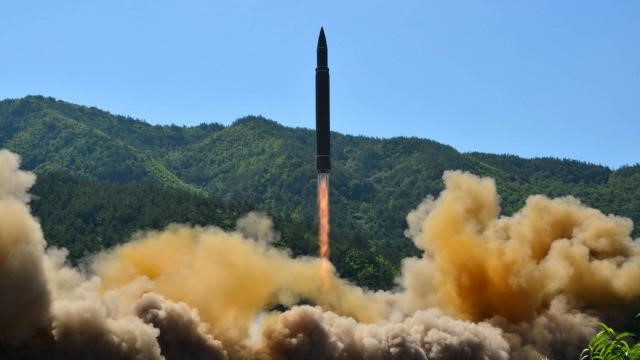
• A North-Korean ICBM. | Archives Reuters
Published in French in Ouest-France* on 27/12/2017
Atomic bombs, estimated at 70 000 at the height of the Cold War, and today 15 000, can provoke war, in Korea for example, and can annihilate humanity. There is hope, however: the 2017 Nobel Peace Prize went to ICAN, the International Campaign to Abolish Nuclear Weapons, in recognition of its action for the Treaty to Ban Nuclear Weapons, which 122 UN member-states voted for on 7 July 2017.
Aimed at abolishing nuclear weapons, this Treaty is both necessary and insufficient. It was necessary, because nuclear arms needed to be banned like biological and chemical weapons, anti-personnel mines and cluster munitions, which all strike soldiers and civilians indiscriminately, committing crimes against humanity.
However the Treaty is insufficient. It will enter into force once 50 states ratify it, but it will commit only the states that do so. None of the nine nuclear-armed states has announced an intention of signing. For the nuclear states, it provides for two methods of joining: before or after disarming. But nothing is foreseen for multilateral disarmament, although that, for the states that believe in their deterrent effect, is the only way they would agree to eliminate them.
It prohibits nuclear weapons «for ever» in all their aspects (possession, fabrication, acquisition, hosting, sale or transfer, threat of use, and use "in any circumstance" ). Yet it authorises a member state to exit from the Treaty and to free itself from its prohibitions after one year, provided only that it invokes "extraordinary" circumstances" - which either exist already or can arise at any time. Thus it admits "deterrence policies" which it condemns in other clauses.
The Treaty emphasizes that the use of nuclear weapons would be catastrophic, but neglects to state that (according to Resolution 1653-XVI adopted by the UN General Assembly on 24 November 1961) it would be a crime against humanity - to recall this would have enabled the ban to be an imperative norm of general international law permitting no exceptions.
Finally, it oversteps its bounds when it affirms (as did the Non-Proliferation Treaty) that there is an "inalienable right for all States Parties to develop research, production and use of nuclear energy for peaceful purposes". This is something that the Ban Treaty had no mandate to prohibit - or to proclaim.
There exists no right to pollute the planet by radioactivity, even peacefully. Besides, nuclear plants, nuclear stocks, nuclear transports are all "dirty bombs" at the mercy of accidents and deliberate attacks.
« Create a Citizens’ Movement »
France is continuing to modernise her nuclear arsenal at a cost of four and soon six billion euros per year, and will not sign this Treaty. But France is bound by the NPT (Non-Proliferation Treaty) to negotiate with the other states the planned elimination of these weapons, under control that is strict. And mutual. So she must without delay commit to an abolition treaty in two parts, two panels: the universal prohibition panel, and the complete elimination panel - the definitive and controlled elimination of nuclear weapons.
It is not enough to ban nuclear weapons, it is essential to abolish them. Only a vast citizens’ movement with this clear objective in view can do that. We call on everybody to create it.**
Signatories in the collective:
Jean-Marie Matagne, president of ACDN ; Patrick Viveret, philosopher ; Bruno Boussagol, stage director ; Françoise Boman, research doctor ; Stéphane Lhomme, director of the Observatoire du nucléaire ; Jean-Jacques Delfour, philosopher ; Pierre Péguin, scientific doctor ; Kolin Kobayashi, independent journalist; Chantal Bourry, writer ; Jacques Terracher, Flight engineer.
• Source
• Hear
• Article de Ouest-France, 27/12/2017, version imprimée :
Notes by ACDN
* Ouest-France, a regional daily circulating in 12 départements of western France, is France’s top daily by circulation (715 000 copies) and number of readers.
** To join or support, write to Action des Citoyens pour le Désarmement Nucléaire: contact@acdn.net
I undersigned
NAME.....................................................
First Name..............................................
Position, Title or Profession..............................................................
E-mail (not published):
Full Post Address (not published):
sign the French Appeal for the Abolition of Atomic Weapons.
